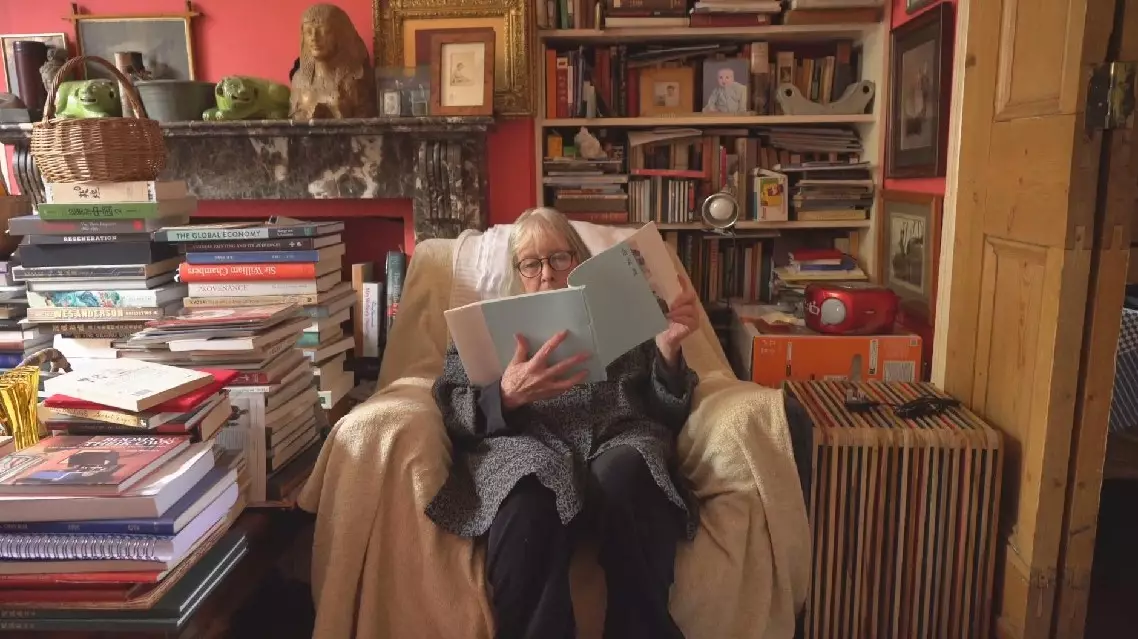风萧萧_Frank
以文会友英国汉学家:中国文化不需要证明自己
2024-07-17
英国著名汉学家表示,中国文化不需要证明自己,她强调,中国独特的文字和建筑不仅是中国文化的象征,也代表了中国在全球舞台上的独特声音。
英国图书馆中国藏品前馆长弗朗西丝·伍德在接受采访时分享了她对中国文化传播的看法,这是中国环球电视网(CGTN)制作的纪念中华人民共和国成立75周年特别系列节目《奔向未来》的一部分
她说,她花了50年甚至更长的时间向人们讲述中国,因为他们对这个国家的一切都很感兴趣。
“我认为中国不需要付出任何努力来让自己的文化更具吸引力。中国文化本身就极具吸引力。中国过去、现在和现在都一样。”她说。
伍德于20世纪70年代在剑桥大学学习中文,之后在中国首都北京的北京大学学习期间曾多次游历中国。她从伦敦大学获得中国建筑硕士学位后,于1977年加入大英图书馆,担任中国藏品馆长30多年,直至 2013 年退休。
在采访中,她回忆起 1971 年第一次去中国的经历。
“中国完全不同。几乎无法描述。我对当时的北京有着美好的回忆,当时它真的是一个有点沉睡的小城市,非常非常迷人,仍然保留着古老的网格系统。但现在,城市转变为大片区域的速度令人难以置信。建设速度、变化速度绝对非同寻常。我不知道作为北京的居民,看到你的城市以每小时 100 英里的速度从你身边飞驰而过会是什么感觉,”她说。
她说,中国文明的魅力在于差异,这确实是魅力的一部分。
“汉语是如此与众不同,非常强大,非常独特,非常中国化。世界上没有其他人可以宣称拥有汉语和文字,以及其非凡的美丽和复杂性。中国在现代世界中拥有非常独特的声音,”伍德说。
她对当代中国年轻人对传统文化越来越感兴趣表示赞赏。
“人们现在可能正在寻求建立一种更加和平和满足的生活,并通过传统思想寻找满足的方式、幸福的方式。想要重新发现和享受过去的美好事物是非常自然的事情,”伍德说。
当被问及中华文明的核心精神是什么时,这位学者说是“非凡的长寿”,她说中国的精髓在于其持久的历史和连续性,包括古老的信仰、创新和文化遗产,这些仍然是其社会的基础。
“我认为,中国文化的本质就在于其非凡的长寿,绵延数千年,中国历史不断向前发展。我认为这种连续性包括儒家信仰,也包括发明、美感和对各种美的欣赏,以及建筑、瓷器和陶瓷生产、丝绸生产等等。我认为所有这些在中国都存在了很长时间。它们对当今中国社会来说非常非常重要,而且是绝对不可或缺的,”伍德说。
Chinese culture does not need to prove itself: British sinologist
2024-07-17
Chinese culture does not need to prove itself, said a renowned British sinologist, who emphasized that China's unique script and architecture are not only symbols of its culture but also represent its distinctive voice on the global stage.
Frances Wood, former curator of the British Library's Chinese collections, shared her views on the transmission of Chinese culture in an interview, part of a special series "Race to the future" commemorating the 75th anniversary of the founding of People’s Republic China, produced by the China Global Television Network (CGTN)
She said she spent 50 or more years talking about China to people because they are so interested in everything about the country.
"I don't think that China needs to make any effort to make its culture more appealing. It is enormously appealing. China was there, is there and remains the same," she said.
Wood studied Chinese at Cambridge University in the 1970s, before traveling extensively in China while studying at Peking University in the Chinese capital of Beijing. After graduating from London University with a master's degree in Chinese Architecture, she joined the British Library in 1977 and served as the curator of the Chinese collections for more than 30 years, until retiring in 2013.
In the interview, she recalled her first trip to China in 1971.
"China was so completely different. It's almost impossible to describe. I have such fond memories of Peking at the time when it was really a kind of little slightly sleepy city, very, very charming, still retaining its old grid system. But now it's unbelievable the speed with which cities have been transformed into massive areas. The speed of building, the speed of change is absolutely extraordinary. I don't know what it can be like really to be an inhabitant of Beijing to see your city go kind of rushing past you at 100 miles an hour," she said.
She said the charm of Chinese civilization lies in the difference, which is really part of the charm.
"The Chinese language is so extraordinarily different, very strong, very distinctive and very Chinese. Nobody else in the world can lay claim as it were to the Chinese language and script and its extraordinary beauty and complexity. China has got a very distinctive, it's got a very distinctive voice in the modern world in that way," Wood said.
She gave a thumb-up to the contemporary Chinese young people as they are increasingly interested in traditional culture.
"People are now perhaps sort of seeking to establish a kind of a more peaceful and contented life and searching for the ways of being content, ways of being happy through traditional ideas. It's a very natural thing to want to kind of rediscover and enjoy again, things that were good in the past," Wood said.
When asked what is the core spirit of Chinese civilization, the scholar said it is "extraordinary longevity," as she said the essence of China lies in its enduring history and continuity, encompassing ancient beliefs, innovations, and cultural heritage that remain fundamental to its society.
"I suppose so intrinsic to China is that extraordinary longevity, that uninterrupted millennia, that Chinese history just goes on backwards and then on forwards. And I think that continuity, which includes things like Confucian beliefs, but also inventions, a sense of beauty and appreciation of different sorts of beauty and architecture and porcelain and ceramic production, silk production and so on. I think all those things are so long lived in China. They are very, very important and absolutely intrinsic to Chinese society today," Wood said.

Chinese culture does not need to prove itself: British sinologist




